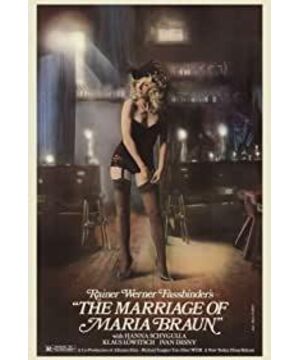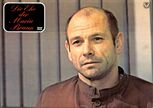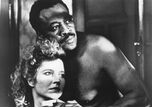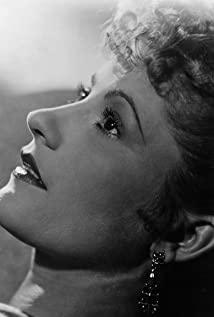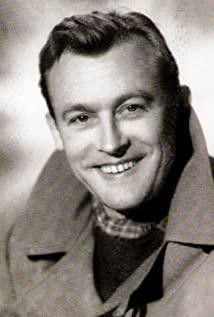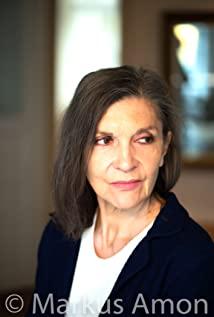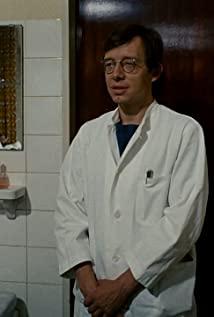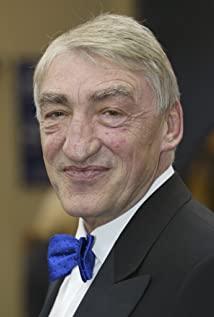"Marriage of Maria Braun", together with "Laura" and "The Desire of Veronica Foss", constitute Rainer Werner Fassbender's "Three German Films for Women" song". As an outstanding representative of the "New German Cinema", Fassbender, through this love tragedy, reflects the painful conditions brought about by the war to the lives of the German people through the tragedy of Maria's rough marriage and her short life of being displaced. As well as the arduous physical and spiritual journey, it is a metaphor for the rise and fall and advance and retreat of German post-war society.
This film, which Fassbender began to create in 1978, is full of strong Hollywood melodrama colors, depicting the ups and downs of a woman's legendary fate. At the same time, Fassbender uses infinite sympathy and alienation. The fate of this character is incorporated into the changes of social times, so that this woman can be vividly interpreted from all aspects of her demeanor, behavior and inner world. Therefore, "Marriage of Maria Braun" has not only been recognized ideologically, but also won considerable box office revenue in terms of commercial value. Such a win-win situation is very important in dozens of art films before Fassbender. rare. It was this win-win situation that made the urchin-like director so excited, and then he shot the German women's films "Laura" and "Veronica" with the German social reality of the 1950s as the background of the era. "The Desire of Foss", completed the so-called female position and female perspective of the new German women's film trilogy.
In order to show Maria's fate after many twists and turns, the film depicts the post-war women's psychology in order to survive in fine detail. Compared with the calm and ruthless social reality, it also brings out the hardships of Maria's life and the spiritual pain she experienced. Of course, the film's ubiquitous coincidences make this a rather dramatic work, which on the one hand has something to do with director Fassbender's preferences, and on the other hand, these coincidences reinforce the sense of compactness of the story and give the film With the connotation and motivation of continuous self-examination.
The film's leading actress Hannah Schugula won the Best Actress Award at the 1979 Berlin International Film Festival, the Outstanding Achievement Award and the New York Film Critics Association's most outstanding performance for her outstanding performance in the film "Maria Braun's Marriage". Best Actress Award. The film also won the Best Technical Award at the 1979 Berlin International Film Festival, and the film was nominated for the Golden Globe Award for Best Foreign Language Film.
About the Director: The Trick of the Witches
Rainer Werner Fassbender, a leading figure in the New German Cinema movement, is known as the Big Four along with Volker Schlondorf, Werner Herzok, and Wim Wenders. giant. And Fassbender directed more films in his short but illustrious life than the other three combined. The most fruitful genius", "The prodigy of German cinema", "German Balzac", "German Andy Warhol", "The giants of cinema alongside Godard and Pasolini", "Contemporary Western Europe The most attractive, talented, unique and original young director."
Fassbender was a child prodigy in the film industry. He was maverick, behaved strangely, and spoke astoundingly. In luxury hotels, like most of his protagonists who die in their prime, his films turn out to be prophecies of his own destiny. Such a madman among the secular people, his works are more or less grotesque. He prefers the eccentric fate of the characters, and he prefers the bizarre lighting effects on the stage, placing the characters in colorful light and shadow. Highlight the inner world of the characters. Even in this "Maria Braun's Marriage" with a strong Hollywood plot color, we can still see the strange tricks of this eccentric person everywhere. The film begins with an alternative marriage. The marriage scene begins with a portrait of Hitler bombed from World War II. On the eve of the collapse of Nazi Germany, our heroine Maria and one of the film's male protagonists, Hermann, arrive. I went to the government city hall to register for marriage. At this time, a bomb exploded in the sky above the city hall, causing the Hitler portrait on the wall to fall, and the marriage certificate also blew up. , finally stamped a legal seal on the marriage certificate. The next day, Herman was called to the front. In a short scene, there are social and political metaphors, dramatic suspense, and a moment of humor in contrast. The scene is chaotic but layered. The language of the scene is quite concise and clear. If it weren't for the genius Fasspin De, it's hard to imagine what this important opening remark will look like.
As early as the mid-1960s, Fassbender used "anti-theatre" to develop the theme of his social drama. Different from the absurdist dramas of Beckett and others who were prevalent in France at that time, Fassbender had stronger demands for realism. He pays more attention to the current scene, the fate of various people after the economic miracle of the former West Germany, and overlooks the panorama of society with Balzac-style supernormal energy. "Marriage of Maria Braun" continues his long-standing concern for social reality. He uses Brecht's dialectical structure to explore the utopian vision of power, sex, and anarchy in a distanced way. . Therefore, unlike the general Western avant-garde directors, Fassbender pays more attention to the conveyance of emotion and the connection between the plot and the real situation of the audience. Like Brecht, he values the educational and transformative functions of his works. The irony in Fassbender's film is to ask the audience to look back at the internal photos in order to "examine their innermost feelings".
View more about The Marriage of Maria Braun reviews


